Launching the #CPUOverload Project: Testing Every x86 Desktop Processor since 2010
by Dr. Ian Cutress on July 20, 2020 1:30 PM ESTCPU Tests: Legacy and Web
In order to gather data to compare with older benchmarks, we are still keeping a number of tests under our ‘legacy’ section. This includes all the former major versions of CineBench (R15, R11.5, R10) as well as x264 HD 3.0 and the first very naïve version of 3DPM v2.1. We won’t be transferring the data over from the old testing into Bench, otherwise it would be populated with 200 CPUs with only one data point, so it will fill up as we test more CPUs like the others.
The other section here is our web tests.
Web Tests: Kraken, Octane, and Speedometer
Benchmarking using web tools is always a bit difficult. Browsers change almost daily, and the way the web is used changes even quicker. While there is some scope for advanced computational based benchmarks, most users care about responsiveness, which requires a strong back-end to work quickly to provide on the front-end. The benchmarks we chose for our web tests are essentially industry standards – at least once upon a time.
It should be noted that for each test, the browser is closed and re-opened a new with a fresh cache. We use a fixed Chromium version for our tests with the update capabilities removed to ensure consistency.
Mozilla Kraken 1.1
Kraken is a 2010 benchmark from Mozilla and does a series of JavaScript tests. These tests are a little more involved than previous tests, looking at artificial intelligence, audio manipulation, image manipulation, json parsing, and cryptographic functions. The benchmark starts with an initial download of data for the audio and imaging, and then runs through 10 times giving a timed result.
Automation involves loading the direct webpage where the test is run and putting it through. All CPUs finish the test in under a couple of minutes, so we put that as the end point and copy the page contents into the clipboard before parsing the result. Each run of the test on most CPUs takes from half-a-second to a few seconds
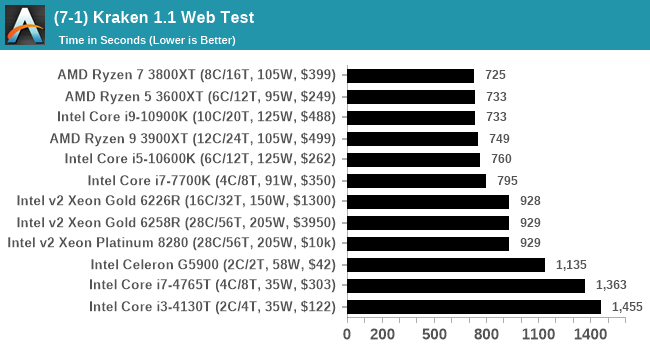
We loop through the 10-run test four times (so that’s a total of 40 runs), and average the four end-results. The result is given as time to complete the test, and we’re reaching a slow asymptotic limit with regards the highest IPC processors.
Google Octane 2.0
Our second test is also JavaScript based, but uses a lot more variation of newer JS techniques, such as object-oriented programming, kernel simulation, object creation/destruction, garbage collection, array manipulations, compiler latency and code execution.
Octane was developed after the discontinuation of other tests, with the goal of being more web-like than previous tests. It has been a popular benchmark, making it an obvious target for optimizations in the JavaScript engines. Ultimately it was retired in early 2017 due to this, although it is still widely used as a tool to determine general CPU performance in a number of web tasks.
Octane’s automation is a little different than the others: there is no direct website to go to in order to run the benchmark. The benchmark page is opened, but the user has to navigate to the ‘start’ button or open the console and initiate the JavaScript required to run the test. The test also does not show an obvious end-point, but luckily does try and aim for a fixed time for each processor. This is similar to some of our other tests, that loop around a fixed time before ending. Unfortunately this doesn’t work if the first loop goes beyond that fixed time, as the loop still has to finish. For Octane, we have set it to 75 seconds per run, and we loop the whole test four times.
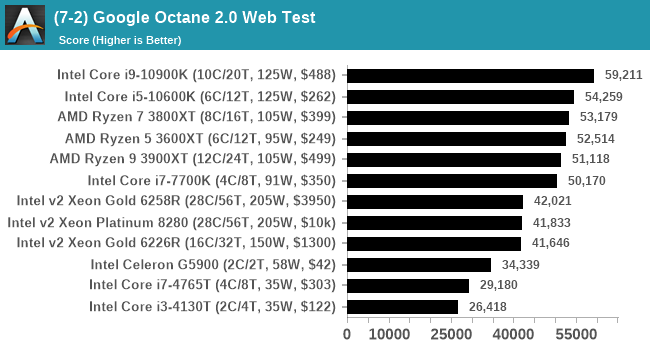
It is worth noting that in the last couple of Intel generations, there was a significant uptick in performance for Intel, likely due to one of the optimizations from the code base that filtered through into the microarchitecture. Octane is still an interesting comparison point for systems within a similar microarchitecture scope.
Speedometer 2: JavaScript Frameworks
Our newest web test is Speedometer 2, which is a test over a series of JavaScript frameworks to do three simple things: built a list, enable each item in the list, and remove the list. All the frameworks implement the same visual cues, but obviously apply them from different coding angles.
Our test goes through the list of frameworks, and produces a final score indicative of ‘rpm’, one of the benchmarks internal metrics. Rather than use the main interface, we go to the admin interface through the about page and manage the results there. It involves saving the webpage when the test is complete and parsing the final result.
We repeat over the benchmark for a dozen loops, taking the average of the last five.
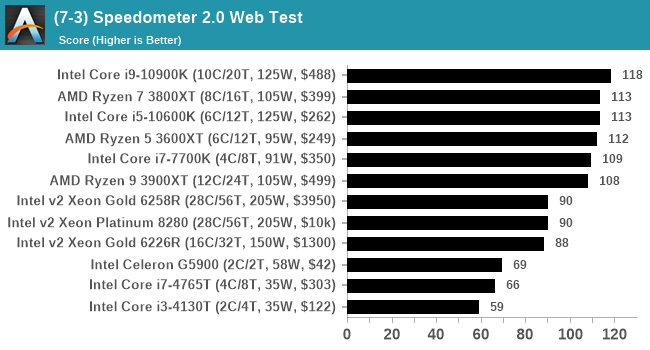


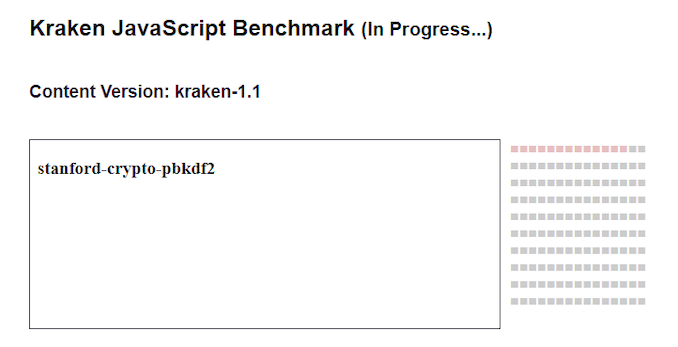
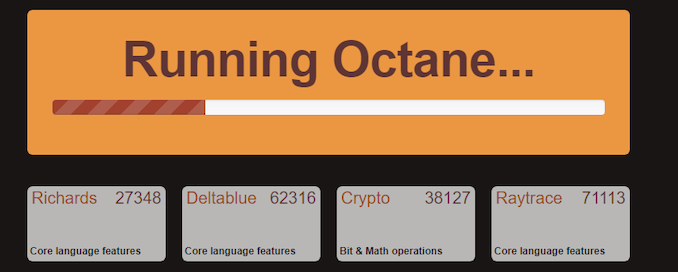
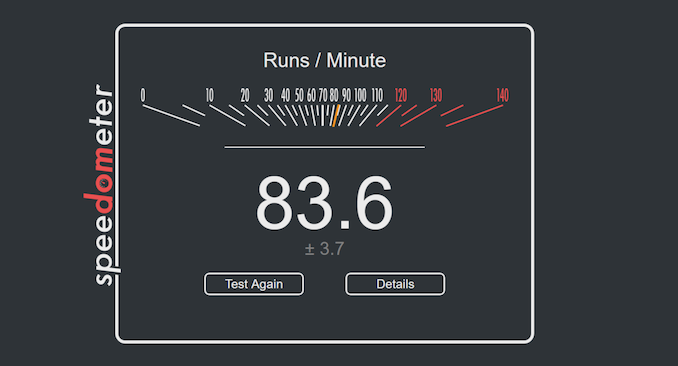








110 Comments
View All Comments
JustAKeyboard - Monday, July 20, 2020 - link
Need to add some Via Nano and Eden entries. How negative does the scaling go on your graphs?Ian Cutress - Monday, July 20, 2020 - link
I have a VX900-I motherboard, but last time I tried to install Windows 10, it wasn't having it.CrystalCowboy - Monday, July 20, 2020 - link
This sounds like a bleep-ton of work. What about mitigations for the various CPU compromises over the last several years?webdoctors - Monday, July 20, 2020 - link
Nice, looking fwd to the comparison of the i2500k with todays procs!Mr Perfect - Monday, July 20, 2020 - link
I especially appreciate that Bench has power consumption in it. Comparing the performance of an old 95w CPU to a new "95w" CPU isn't complete without seeing those numbers.lightningz71 - Monday, July 20, 2020 - link
Are you interested in processor donations from us for this project? I am reasonably certain that I have an i5-2400 that is in working condition on my shelf that I could gladly send your way.If you maintain an actively updated list somewhere that includes the processors that you have, and the ones that you are still looking for, and how to get them to you, I'm sure that, especially for the older ones, many of us are happy to help you out!
sorten - Monday, July 20, 2020 - link
This sounds incredible! Thank you, Ian.8aravindk - Monday, July 20, 2020 - link
Please consider open sourcing this project, not in terms of benchmarks, which you need to run yourself for authenticity, but maintain a publicly accessible wish list of processors (Like that Excel screenshot in yellow and red), I am sure people would love to donate their old processors that they were gonna chuck anyway, this would also reduce your investment by quite a bit. Also, please consider a cheap subscription as your ads are not good, people use reading modes now and I’ll gladly pay for your service.danjw - Monday, July 20, 2020 - link
I would really like to see the AMD Ryzen 2700X added.WiseSwampDragon - Monday, July 20, 2020 - link
I have an old system with a AMD Geode LX 800 CPU. I'd love to see that one in the Bench DB.